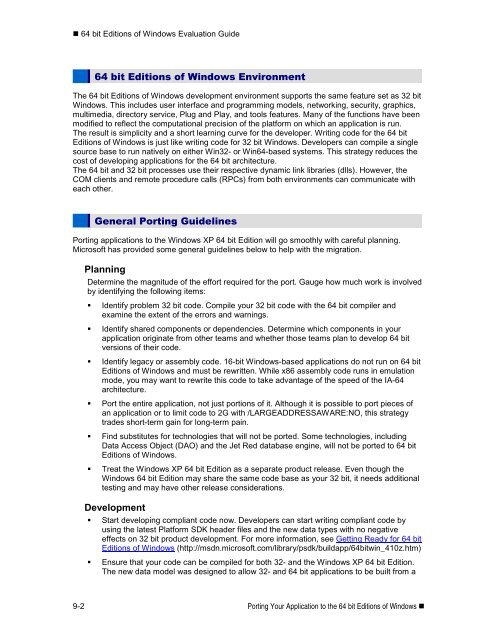64 bit Editions of Windows Evaluation Guide - Technology and Trends
64 bit Editions of Windows Evaluation Guide - Technology and Trends
64 bit Editions of Windows Evaluation Guide - Technology and Trends
Create successful ePaper yourself
Turn your PDF publications into a flip-book with our unique Google optimized e-Paper software.
� <strong>64</strong> <strong>bit</strong> <strong>Editions</strong> <strong>of</strong> <strong>Windows</strong> <strong>Evaluation</strong> <strong>Guide</strong><br />
<strong>64</strong> <strong>bit</strong> <strong>Editions</strong> <strong>of</strong> <strong>Windows</strong> Environment<br />
The <strong>64</strong> <strong>bit</strong> <strong>Editions</strong> <strong>of</strong> <strong>Windows</strong> development environment supports the same feature set as 32 <strong>bit</strong><br />
<strong>Windows</strong>. This includes user interface <strong>and</strong> programming models, networking, security, graphics,<br />
multimedia, directory service, Plug <strong>and</strong> Play, <strong>and</strong> tools features. Many <strong>of</strong> the functions have been<br />
modified to reflect the computational precision <strong>of</strong> the platform on which an application is run.<br />
The result is simplicity <strong>and</strong> a short learning curve for the developer. Writing code for the <strong>64</strong> <strong>bit</strong><br />
<strong>Editions</strong> <strong>of</strong> <strong>Windows</strong> is just like writing code for 32 <strong>bit</strong> <strong>Windows</strong>. Developers can compile a single<br />
source base to run natively on either Win32- or Win<strong>64</strong>-based systems. This strategy reduces the<br />
cost <strong>of</strong> developing applications for the <strong>64</strong> <strong>bit</strong> architecture.<br />
The <strong>64</strong> <strong>bit</strong> <strong>and</strong> 32 <strong>bit</strong> processes use their respective dynamic link libraries (dlls). However, the<br />
COM clients <strong>and</strong> remote procedure calls (RPCs) from both environments can communicate with<br />
each other.<br />
General Porting <strong>Guide</strong>lines<br />
Porting applications to the <strong>Windows</strong> XP <strong>64</strong> <strong>bit</strong> Edition will go smoothly with careful planning.<br />
Micros<strong>of</strong>t has provided some general guidelines below to help with the migration.<br />
Planning<br />
Determine the magnitude <strong>of</strong> the effort required for the port. Gauge how much work is involved<br />
by identifying the following items:<br />
� Identify problem 32 <strong>bit</strong> code. Compile your 32 <strong>bit</strong> code with the <strong>64</strong> <strong>bit</strong> compiler <strong>and</strong><br />
examine the extent <strong>of</strong> the errors <strong>and</strong> warnings.<br />
� Identify shared components or dependencies. Determine which components in your<br />
application originate from other teams <strong>and</strong> whether those teams plan to develop <strong>64</strong> <strong>bit</strong><br />
versions <strong>of</strong> their code.<br />
� Identify legacy or assembly code. 16-<strong>bit</strong> <strong>Windows</strong>-based applications do not run on <strong>64</strong> <strong>bit</strong><br />
<strong>Editions</strong> <strong>of</strong> <strong>Windows</strong> <strong>and</strong> must be rewritten. While x86 assembly code runs in emulation<br />
mode, you may want to rewrite this code to take advantage <strong>of</strong> the speed <strong>of</strong> the IA-<strong>64</strong><br />
architecture.<br />
� Port the entire application, not just portions <strong>of</strong> it. Although it is possible to port pieces <strong>of</strong><br />
an application or to limit code to 2G with /LARGEADDRESSAWARE:NO, this strategy<br />
trades short-term gain for long-term pain.<br />
� Find substitutes for technologies that will not be ported. Some technologies, including<br />
Data Access Object (DAO) <strong>and</strong> the Jet Red database engine, will not be ported to <strong>64</strong> <strong>bit</strong><br />
<strong>Editions</strong> <strong>of</strong> <strong>Windows</strong>.<br />
� Treat the <strong>Windows</strong> XP <strong>64</strong> <strong>bit</strong> Edition as a separate product release. Even though the<br />
<strong>Windows</strong> <strong>64</strong> <strong>bit</strong> Edition may share the same code base as your 32 <strong>bit</strong>, it needs additional<br />
testing <strong>and</strong> may have other release considerations.<br />
Development<br />
� Start developing compliant code now. Developers can start writing compliant code by<br />
using the latest Platform SDK header files <strong>and</strong> the new data types with no negative<br />
effects on 32 <strong>bit</strong> product development. For more information, see Getting Ready for <strong>64</strong> <strong>bit</strong><br />
<strong>Editions</strong> <strong>of</strong> <strong>Windows</strong> (http://msdn.micros<strong>of</strong>t.com/library/psdk/buildapp/<strong>64</strong><strong>bit</strong>win_410z.htm)<br />
� Ensure that your code can be compiled for both 32- <strong>and</strong> the <strong>Windows</strong> XP <strong>64</strong> <strong>bit</strong> Edition.<br />
The new data model was designed to allow 32- <strong>and</strong> <strong>64</strong> <strong>bit</strong> applications to be built from a<br />
9-2 Porting Your Application to the <strong>64</strong> <strong>bit</strong> <strong>Editions</strong> <strong>of</strong> <strong>Windows</strong> �



